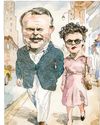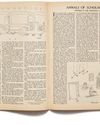
My mother began taking me to the movies when I was a little boy of three or four. She worked at factory and other menial jobs during the day, and when she came home I was the only company she had. Afterward, I’d go through the characters in my head and bring them to life, one by one, in our apartment.
The movies were a place where my single mother could hide in the dark and not have to share her Sonny Boy with anyone else. That was her nickname for me. She had picked it up from the popular song by Al Jolson, which she often sang to me.
When I was born, in 1940, my father, Salvatore Pacino, was all of eighteen, and my mother, Rose Gerardi Pacino, was just a few years older. Suffice it to say that they were young parents, even for the time. I probably hadn’t even turned two when they split up. My mother and I lived in a series of furnished rooms in Harlem and then moved into her parents’ apartment, in the South Bronx. We hardly got any financial support from my father. Eventually, we were allotted five dollars a month by a court, just enough to cover our expenses at my grandparents’ place.
The earliest memory I have of being with both my parents is of watching a movie with my mother in the balcony of the Dover Theatre when I was around four. It was some sort of melodrama for adults, and my mother was transfixed. My attention wandered, and I looked down from the balcony. I saw a man walking around below, looking for something. He was wearing the dress uniform of an M.P.—my father served as a military-police soldier during the Second World War. He must have seemed familiar, because I instinctively shouted out, “Dada!” My mother shushed me. I shouted for him again: “Dada!” She kept whispering, “Shh—quiet!” She didn’t want him to find her.
Esta historia es de la edición September 02, 2024 de The New Yorker.
Comience su prueba gratuita de Magzter GOLD de 7 días para acceder a miles de historias premium seleccionadas y a más de 9,000 revistas y periódicos.
Ya eres suscriptor ? Conectar
Esta historia es de la edición September 02, 2024 de The New Yorker.
Comience su prueba gratuita de Magzter GOLD de 7 días para acceder a miles de historias premium seleccionadas y a más de 9,000 revistas y periódicos.
Ya eres suscriptor? Conectar

SUBJECT AND OBJECT
What happened when Lillian Ross profiled Ernest Hemingway.

ROYAL FLUSH
The fall of red.

Roz Chast on George Booth's Cartoons
There's almost nothing I like more than a laughing fit. It is a non-brain response, like an orgasm or a sneeze.

CHUKA
I have always longed to be known, truly known, by another human being. Sometimes we live for years with yearnings that we cannot name.

Rachel Aviv on Janet Malcolm's "Trouble in the Archives"
As Janet Malcolm worked on \"Trouble in the Archives,\" a two-part piece about prominent psychoanalysts who disagreed about Freud, she began a correspondence with Kurt Eissler, the head of the Sigmund Freud Archives.

PERSONAL HISTORY - A VISIT TO MADAM BEDI
I was estranged from my own mother, so a friend tried to lend me his.

AMERICAN CHRONICLES - WAR OF WORDS
Editors, writers, and the making of a magazine.

LIVE FROM NEW YORK
A new docuseries commemorates fifty years of \"Saturday Night Live.\"

TANGLED WEB
An arachnophobe pays homage to the spider.

TROUBLE IN PARADISE
Mike White's mischievous morality plays.
